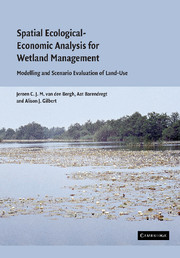 Spatial Ecological-Economic Analysis for Wetland Management
Spatial Ecological-Economic Analysis for Wetland Management Book contents
- Frontmatter
- Contents
- List of figures
- List of tables
- Preface
- 1 Introduction
- 2 Wetlands and science
- 3 Integrated modelling and assessment
- 4 Theoretical framework and method of integrated study
- 5 The Vecht area: history, problems and policy
- 6 Development scenarios for the Vecht area
- 7 The spatial–ecological model: hydrology and ecology
- 8 The spatial–economic model: agriculture, nature conservation and outdoor recreation
- 9 Performance indicators for the evaluation
- 10 Evaluation of the scenarios
- 11 Conclusions: policy and research implications
- References
- Index
4 - Theoretical framework and method of integrated study
Published online by Cambridge University Press: 24 November 2009
- Frontmatter
- Contents
- List of figures
- List of tables
- Preface
- 1 Introduction
- 2 Wetlands and science
- 3 Integrated modelling and assessment
- 4 Theoretical framework and method of integrated study
- 5 The Vecht area: history, problems and policy
- 6 Development scenarios for the Vecht area
- 7 The spatial–ecological model: hydrology and ecology
- 8 The spatial–economic model: agriculture, nature conservation and outdoor recreation
- 9 Performance indicators for the evaluation
- 10 Evaluation of the scenarios
- 11 Conclusions: policy and research implications
- References
- Index
Summary
Objective and approach
The Vecht area study is intended to contribute to the development of an integrated framework and method for multidisciplinary analysis of policy and management scenarios for areas dominated by wetland ecosystems. The nature of wetlands, characterised by transitions from land to water, is such that several disciplines need to provide information and insights to allow evaluation of the impacts of proposed changes in wetlands areas. These changes include, for example, land reallocation, management of water tables, regulation of economic activities and construction of infrastructure. As discussed in Chapter 2, the core disciplines in wetlands research are hydrology, ecology and economics. Hydrology studies qualitative and quantitative aspects of stocks and flows of groundwater and surface water. Ecology studies the relationship of living organisms with their environment. Economics studies the behaviour of households and companies in the context of market interactions between the demand and supply of goods and services. As discussed in Chapter 3, these disciplines can be integrated for the purpose of case studies through the use of integrated economic–environmental modelling. The approach adopted in the Vecht area study is consistent with the very basic and general drivers–pressured–state–impact–response (DPSIR) framework that was discussed in Section 2.4. Chapter 5 will present each of the elements of this framework in the context of the case study.
Information
- Type
- Chapter
- Information
- Spatial Ecological-Economic Analysis for Wetland ManagementModelling and Scenario Evaluation of Land Use, pp. 83 - 88Publisher: Cambridge University PressPrint publication year: 2004